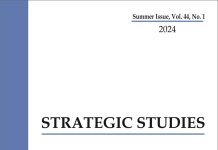Abstract:
The contemporary emerging security trends seem destined to marginalising the potential and legitimacy of the nuclear non-proliferation regime. The transformation in the international settings have modified state actors’ behaviour at the domestic level and resultantly, states have started orienting themselves to a changed environment contrary to the set non-proliferation norms. This study investigates some pertinent questions: why was the regime created in the first place? What are the problems attached to the regime and how have emerging trends further undermined the scope and role of this regime? Why is the regime important for the future security environment? What could possibly happen if the regime is not made effective with renewed realisable objectives? The study asks why there is an urgent need to establish a stringent norm against proliferation of nuclear weapons and make it consistent with emerging realities. This study concludes that most of the non-proliferation problems from the outset are associated with the structure of this regime and considered as a system level interplay (politics at the level of major powers) due to states’ relative interests. Thus, it has been argued that the most powerful component, the linchpin of this regime such as the nuclear non-proliferation treaty (NPT), demands structural revision, thereby reinforcing the remaining arrangements within the regime in the present security order. The revised structure of the regime and states’ modified behaviour at the system level will only secure the legitimacy and spirit of this regime.












